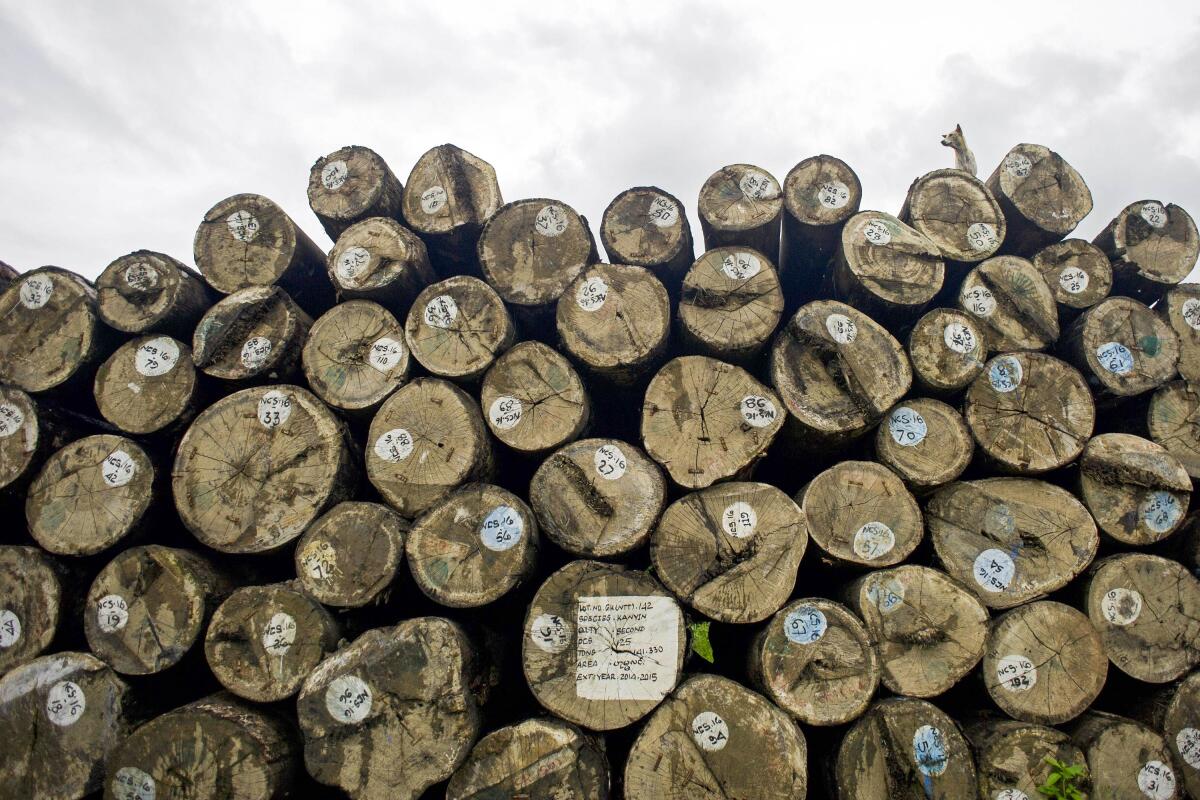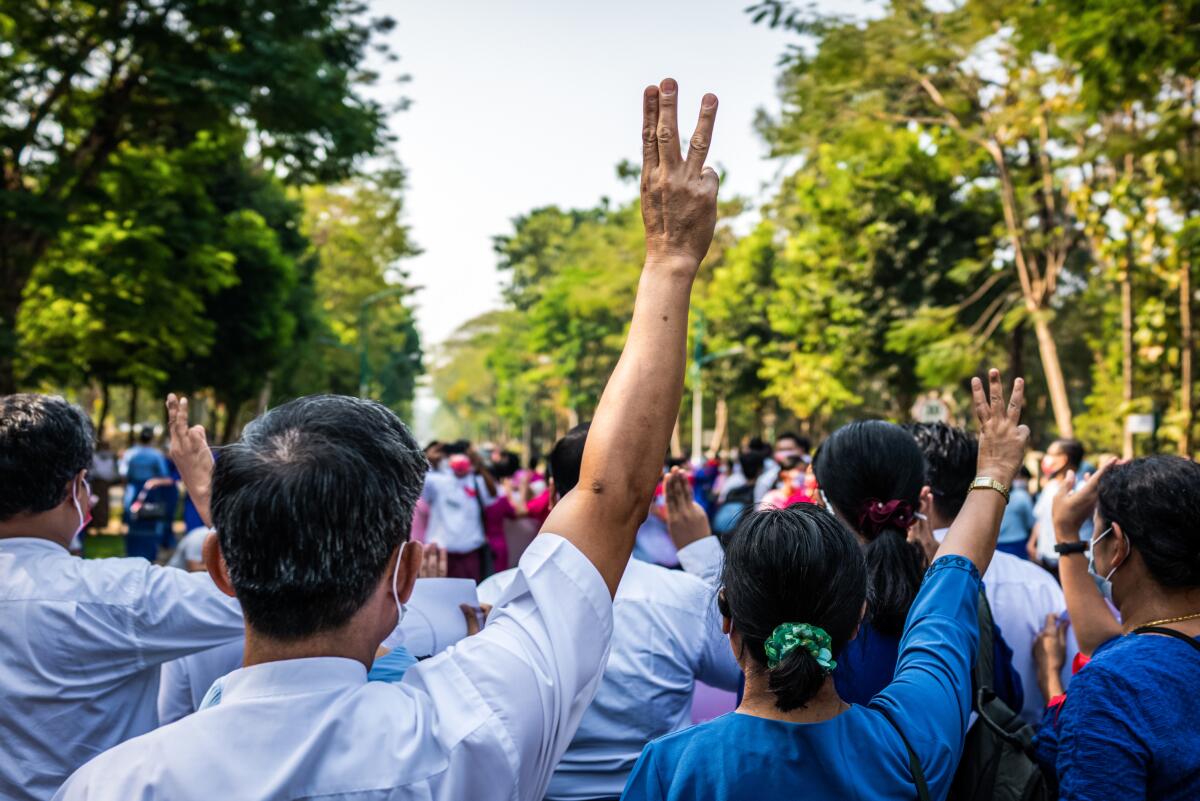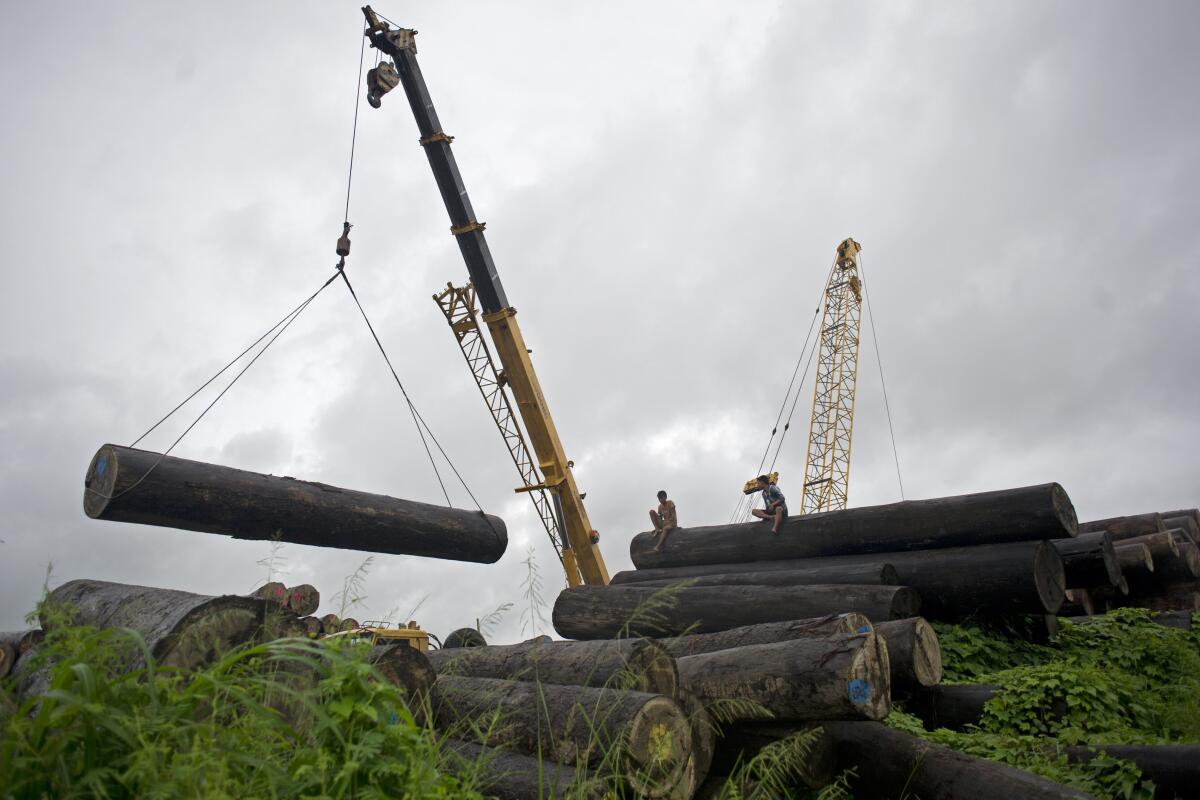Myanmar teak shipments imported to U.S. despite sanctions, group says

- Share via
SINGAPORE — More than 1,700 tons of teak — much of it evading economic sanctions — were exported to the United States from Myanmar after the Southeast Asian country’s military seized power in a coup last year, a watchdog group says.
Shipments over the last year of the highly coveted hardwood prized by luxury yacht builders were nearly equal to 2020 despite U.S. sanctions imposed on Myanmar’s largest state-owned lumber company, Myanma Timber Enterprise, nearly three months after the Feb. 1 military takeover.
The timber trade helps finance repression and human rights abuses, according to Justice for Myanmar, an advocacy group that investigates the business dealings of the nation’s military. More than 1,400 people have been killed by security forces since the democratically elected civilian government was deposed. Atrocities by the military are on the rise, particularly in Myanmar’s border regions where armed resistance has intensified.

“Continuing trade in timber from Myanmar supports the illegal military junta that is committing atrocity crimes with total impunity, including the indiscriminate murder of children,” Yadanar Maung, a spokesperson for Justice for Myanmar, said in a statement upon release of the group’s report. “We call on the U.S. government to ban all Myanmar timber imports to prevent further revenue from reaching the illegal military junta.”
Myanmar’s government generated $100 million in taxes and royalties on the timber trade during the 2017-18 financial year, according to the most recent data available published by the Extractive Industries Transparency Initiative. Timber, along with oil, gas, minerals and gems, form the backbone of the country’s natural resources industries. The junta is intent on exploiting and exporting them to prop up an economy in free-fall after months of unrest.
Last year the military, also known as the Tatmadaw, held several auctions to sell hardwood, including teak, from a stockpile of 200,000 tons of illegally harvested timber seized by the former civilian government. Some of that lumber is believed to have been shipped to the U.S. through intermediaries, Justice for Myanmar said. Eighty-two shipments of teak consisting mostly of board and scantling used for shipbuilding, outdoor decking and furniture were exported last year, according to the watchdog group, whose findings were gleaned from the trade database Panjiva.
The military is lashing out with growing brutality as resistance intensifies. Teenagers are among the latest victims, believed to have been burned alive.
Myanmar, also known as Burma, is the source of what’s widely considered the finest teak in the world because of its durability and smooth surface. British colonial firms used elephants in the 1800s to plunder Burma’s forests for tropical hardwood to outfit the Royal Navy’s vessels with teak. Even today, elephants are common in logging operations in forests inaccessible by vehicles.
Demand for timber from Thailand, China, India and Europe exploded in the 1990s, leading to a surge in illegal logging and multinational corruption that enriched the military elite and funded ethnic insurgent groups along Myanmar’s borders, according to the London-based Environmental Investigation Agency, which has uncovered extensive criminal activity in the industry.
Rampant deforestation led to the loss of nearly 29,000 square miles of forest in Myanmar between 1990 and 2010, amounting to 19% of the nation’s forest cover or an area larger than Ireland.
It wasn’t until 2014 that the government banned the export of teak logs. Activists say with the military now in power that ban is in jeopardy: “The coup has just exacerbated and allowed for a greater space of criminality into which the main profiteers will be the junta,” said Faith Doherty, head of forest campaigns at the Environmental Investigation Agency.
Even before sanctions last year, importing wood from Myanmar was risky for buyers in the West. The U.S. Lacey Act and the European Union Timber Regulation prohibit the importation of illegally sourced timber and require a level of traceability that’s difficult to verify in Myanmar’s corruption-riddled supply chain.
The U.S. blacklisting of Myanma Timber Enterprise on April 21 effectively amounts to a ban on Burmese timber. The state-owned company is the official clearinghouse for Myanmar’s timber industry, operating sawmills and overseeing exports.
“The forestry industry in Myanmar is effectively controlled by MTE,” said Justice for Myanmar, which is calling for a ban on Burmese timber because importers can still use intermediaries to illegally circumvent sanctions on Myanma Timber Enterprise. The group is urging the U.S. to investigate last year’s teak shipments, including banks and logistics companies involved in the transactions.
Justice for Myanmar’s report shows that nearly half the 1,725 tons of teak imported to the U.S. last year after the coup was purchased by East Teak Fine Hardwoods in Donalds, S.C. Another 15% was imported by J. Gibson McIlvain, a lumber wholesaler in White Marsh, Md. Both companies have been among the biggest U.S. importers of Burmese teak for years, using the hardwood for boat decks, flooring and siding.
Kyal Sin wore a T-shirt that said ‘Everything will be OK’ when she was shot by Myanmar security forces on the deadliest day since the military coup.
Neither firm responded to a request for comment. On its website, J. Gibson McIlvain says it maintains relationships with Burmese mills and exporters that “stretch back centuries” and that it complies with government regulations.
“The relationship between the U.S. and Myanmar is a confusing one, and it is imperative we stay on top of it to ensure we are importing lumber legally to protect our customers who buy from us,” the website says. Shannon Rogers, the company’s director of marketing, recorded a podcast shortly after sanctions against Myanma Timber Enterprise were announced discussing alternatives to teak.

“You cannot buy teak from Myanmar without going through the MTE,” he said, adding that the junta was “killing women and children” and making the Tiananmen Square massacre look like “Romper Room.”
Other companies named in the report with much smaller shares of imports include Lumberbest of Alhambra, Kingsley Bate of Manassas, Va., and World Panel Products of Riviera Beach, Fla.
In an email, Clay Kingsley of Kingsley Bate said his purchases were legal and comprised of “a few containers” of furniture, not lumber.
Jeff Davies of World Panel Products said his imports were purchased legally prior to the coup through exporters vetted by the International Wood Products Assn. “We vehemently oppose any abuse of human rights and any direct correlation or links to governments such as the current junta,” Davies said in an email. The trade association did not respond to a request for comment.
Lumberbest also did not respond to a request for comment.
Since the coup, the U.S. has imposed sanctions on dozens of Tatmadaw officials and associates, military conglomerates and companies in the gems and mining industries. Calls are growing to extend sanctions to Myanmar’s multibillion-dollar oil and gas industry, the country’s largest source of foreign currency.
The U.S. Treasury Department’s Office of Foreign Asset Control, which is responsible for enforcing sanctions, declined to comment on the teak findings in the Justice for Myanmar report.
“The laws surrounding international sanctions compliance are notoriously complex and enforcement hamstrung by limited resourcing and political whim,” said Timothy Stanley, Asia director for the consultancy the Risk Advisory Group. “Many smaller companies are likely taking a calculated risk that under-resourced enforcement authorities will not pursue sanctions investigations against them for trading with Myanmar. But it stretches credibility that these same businesses are unaware of the prevailing sanctions environment and the potential legal and regulatory risks of breaching them.”
More to Read
Sign up for Essential California
The most important California stories and recommendations in your inbox every morning.
You may occasionally receive promotional content from the Los Angeles Times.













